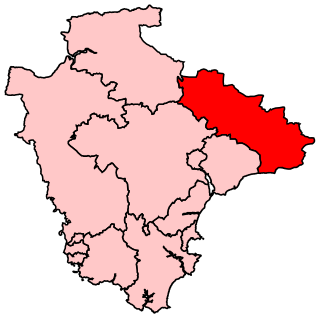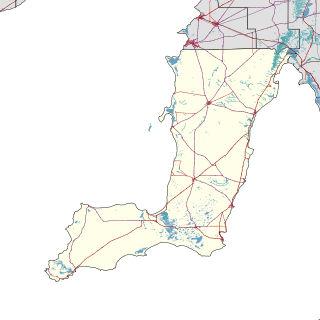
East Devon is a local government district in Devon, England. Its council has been based in Honiton since February 2019, and the largest town is Exmouth.

The A35 is a road in southern England, connecting Honiton in Devon and Southampton in Hampshire. It is a trunk road for some of its length. Most of its route passes through Dorset and the New Forest. It originally connected Exeter and Southampton, the original A35 ran along what is now the A3052 joining the present road at Charmouth.

Hembury is a Neolithic causewayed enclosure and Iron Age hill fort near Honiton in Devon. Its history stretches from the late fifth and early fourth millennia BC to the Roman invasion. The fort is situated on a south facing promontory at the end of a 240m high ridge in the Blackdown Hills. It lies to the north of and overlooking the River Otter valley and this location was probably chosen to give good views of the surrounding countryside as well as for defensive reasons.

Tiverton and Honiton is a constituency in Devon represented in the House of Commons of the UK Parliament since 2010 by Neil Parish, a Conservative.

The Queen Elizabeth II Golden Jubilee Medal or the Queen's Golden Jubilee Medal was a commemorative medal created in 2002 to mark the fiftieth anniversary of Elizabeth II's accession. The Queen Elizabeth II Golden Jubilee Medal was awarded in Canada to nominees who contributed to public life. The Queen's Golden Jubilee Medal was awarded to active personnel in the British Armed Forces and Emergency Personnel who had completed 5 years of qualifying service.

Honiton railway station serves the town of Honiton in east Devon, England. It was opened by the London and South Western Railway (LSWR) in 1860 and is now operated by South Western Railway which provides services on the West of England Main Line. It is 154 miles 60 chains (249.0 km) down the line from London Waterloo.

Buckerell is a small village and civil parish in the East Devon district of Devon, England. The village is about 2.5 miles west of the nearest town, Honiton. In the 2001 census a population of 270 was recorded for the parish, which is surrounded clockwise from the north by the parishes of Awliscombe, Honiton, Gittisham, Feniton and Payhembury.

Honiton was a parliamentary constituency centred on the town of Honiton in east Devon, formerly represented in the House of Commons of the Parliament of the United Kingdom. It sent members intermittently from 1300, consistently from 1640. It elected two Members of Parliament (MPs) until it was abolished in 1868. It was recreated in 1885 as a single-member constituency.
Pomeroy Wood is the site near Honiton in Devon of a Roman military site of unknown type, probably either a fort or marching camp, though archaeological investigations have proved inconclusive. The site is at SY1399.
The Honiton by-election, 1967 was a by-election held for the British House of Commons constituency of Honiton in Devon on 16 March 1967. It was won by the Conservative Party candidate Peter Emery.
The following radio stations broadcast on FM frequency 87.7 MHz:

Honiton Community College is a comprehensive academy school located in Honiton, Devon, England. It was originally established as Honiton Secondary School in 1938, and converted to an academy in 2011. The school educates around 735 students, of whom 95 are in age 16-19 study programmes, and employs 124 staff. The current principal is Glenn Smith, who took up the post in September 2009 following the retirement of predecessor Norman Tyson.

The Aller Vale Pottery was formed in 1865 on the northern edge of the village of Kingskerswell in South Devon, England on the likely site of a medieval pottery. It became well known for the creation of art pottery at the end of the 19th century and gained Royal patronage, but declined thereafter, closing on this site in about 1924. The name continued in use until 1962 related to the production of mass-produced motto ware for the tourist market.

Honiton lace is a type of bobbin lace made in Honiton, Devon. Historical Honiton lace designs focused on scrollwork and depictions of natural objects such as flowers and leaves.

Clyst Honiton is an English village and civil parish five miles from Exeter in the East Devon district, in the county of Devon. The church is St Michael and All Angels. Exeter International Airport which opened in 1938 is located on the outskirts of the village. The village was originally on the main A30 road from Exeter to Honiton but was bypassed in the 1990s. Another bypass to the east of the village linking the A30 to the new developments around Cranbrook opened in October 2013.
Gittisham is a village and civil parish in Devon near Honiton. The village is 3 miles (5 km) from Ottery St Mary and it has a church called St Michael. The parish is surrounded, clockwise from the north, by the parishes of Awliscombe, Honiton, Sidmouth, Ottery St Mary, Feniton and Buckerell.

Honiton is a locality in the Australian state of South Australia located on the south coast of Yorke Peninsula immediately adjoining Investigator Strait about 89 kilometres west of the state capital of Adelaide and about 5 kilometres west of the Edithburgh town centre.

Honiton Town Football Club is a football club based in Honiton, Devon, England. They are currently members of the South West Peninsula League Premier Division East and play at Mountbatten Park.
















